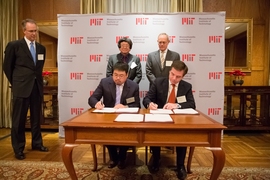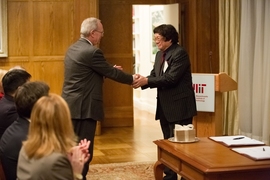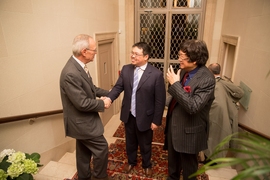MIT has received one of the largest gifts in its history, from alumnus Samuel Tak Lee ’62, SM ’64, to establish a real estate entrepreneurship lab that will promote social responsibility among entrepreneurs and academics in the real estate profession worldwide, with a particular focus on China. The gift will fund fellowships to attract both U.S. and international students; will support research on sustainable real estate development and global urbanization; and will make the lab’s curriculum available online to learners worldwide via MITx.
The $118 million gift was formalized yesterday at a signing ceremony at MIT, attended by Lee; his son, Samathur Li; MIT President L. Rafael Reif; Executive Vice President and Treasurer Israel Ruiz; Chancellor for Academic Advancement Eric Grimson; and Vice President for Resource Development Julie Lucas. In recognition of Lee’s substantial and ongoing commitment to the Institute, Building 9, home to the MIT Center for Real Estate, will be named the Samuel Tak Lee Building.
“With this gift, Sam Lee aims to tap the transformative power of real estate to shape the built environment, and thereby to shape society and culture, to enrich our shared civic life, to increase our harmony with nature — in short, to make a significant positive impact on the world,” Reif says. “As MIT strives to work for the betterment of humankind, Sam’s generosity dramatically increases our capacity to create and inspire far-reaching positive change. We are deeply grateful for the vision and partnership of the Lee family, and for the trust they have placed in MIT.”
Lee says his gift was motivated by a desire to design a program with MIT that tightly ties the study of real estate to 21st-century realities such as land reform, environmental challenges, burgeoning populations, and an evolving global economy.
“This is a period of tremendous change and opportunity for entrepreneurs in China and around the world,” Lee says. “By cultivating a long-term perspective, real estate professionals can create even greater value for themselves and for society based on responsible, sustainable strategies. I am eager to connect ambitious, talented students with the skills and knowledge that will help them succeed.”
The new Samuel Tak Lee MIT Real Estate Entrepreneurship Lab will be housed in MIT’s Department of Urban Studies and Planning (DUSP) and the Center for Real Estate (CRE). The CRE investigates the real estate transaction from initial concept to market reality through a cross-disciplinary lens, including design, urban planning, environmental studies, construction, management, economics, finance, policy and regulation, and the law. MIT is a pioneer in the study of real estate, becoming the first university to offer a Master of Science degree in real estate development in 1983.
“Real estate is inherently interdisciplinary, and so is the culture of MIT,” Grimson says. “Whether turning its attention to the role of real estate in fostering prosperity, the design of cities, or the consumption of energy, this new lab will be strengthened by interactions with departments and programs across MIT.”
The lab’s professors and students, Grimson says, will seek partners within the School of Architecture and Planning — such as the Center for Advanced Urbanism, the Media Lab, and the Building Technology Program — as well as from the MIT Sloan School of Management, and from such MIT departments as civil and environmental engineering, materials science and engineering, economics, anthropology, and others that share an interest in responsible real estate development.
While preliminary work with respect to the Samuel Tak Lee MIT Real Estate Entrepreneurship Lab will begin immediately, formal program activities will commence in the 2015-16 academic year under the leadership of an endowed faculty chair and an administrative director, still to be announced. The gift will also establish a “Think Tank” and a research fund to ensure MIT’s continued commitment to research and thought leadership in sustainable and socially responsible real estate development and global urbanization. Some of the topics and projects that the lab will focus on include: development and urbanization through private action and entrepreneurship; urban resilience and adaptation; land-use reform regulations and codes; new construction materials; data and technology; affordable housing; and environmental aspects of urban growth and development.
According to Albert Saiz, the director of the MIT Center for Real Estate, the lab will explore questions of social responsibility — ranging from the individual’s obligations to society to the impact of the built environment on the natural environment — that are essential to how CRE prepares its students to operate in a complex global market.
“We want our graduates to become catalysts for profitable development around the world,” says Saiz, who is the Daniel Rose Associate Professor of Urban Economics and Real Estate. “At the same time, we believe the real estate profession must develop nuanced solutions to global concerns such as environmental change, population growth, and transforming economies.”
The Samuel Tak Lee MIT Real Estate Entrepreneurship Lab will attract top research talent from around MIT and beyond, Saiz notes. “The lab’s graduate students, visiting scholars, and practitioners will also become a leading global community for the development of successful models of sustainable real estate,” he says. “And the lab’s educational program will inspire a new generation of socially conscious and knowledgeable citizens and entrepreneurs.”
Accordingly, the lab will emphasize both the practical — for example, developing new case studies, the major component of a CRE and DUSP education — and the global, focusing on the rapidly changing real estate practice in China.
“Deepening our understanding of development in China through the Samuel Tak Lee MIT Real Estate Entrepreneurship Lab has the potential to inform our broader outlook on urbanization, city planning, and design,” says Eran Ben-Joseph, professor and head of MIT’s Department of Urban Studies and Planning. Ben-Joseph says that DUSP’s extensive history in China — such as the Beijing Urban Design Studio, a summer exchange between MIT and Tsinghua University that dates back to 1984 — will give the lab a running start.
“The issues that create complexity in Chinese real estate, such as migration, land ownership, and environmental impacts, make it a fertile area for research and practice,” Ben-Joseph says. “Lessons learned from China can serve as models worldwide.”
The gift will provide fellowships to attract graduate students of diverse geographic, social, and economic origins to study real estate entrepreneurship on MIT’s campus, with an emphasis on students from China. And MITx will share the lab’s curriculum with a global audience by translating its content to massive open online courses.
“Throughout China — and all over the world — there are talented young people with a strong capacity to take individual initiative,” Lee says. “My hope is that by offering them MIT-level tools and perspectives, the lab will empower students from all backgrounds to take their place among the next generation of global real estate entrepreneurs.”
Lee received two degrees from MIT: a bachelor’s degree in 1962 and a master’s degree in 1964, both in civil and environmental engineering. After graduating from MIT, he joined Prudential Enterprise, a Hong Kong–based real estate company founded by his father and a cousin. Under Lee’s leadership in the following decades, Prudential has grown into a multinational firm with significant holdings in Hong Kong, England, Japan, Switzerland, and Singapore. Lee is widely known for his 1994 acquisition and development of the Langham Estate in London’s West End, approximately 14 acres of commercial space that is now a major business and shopping destination.














